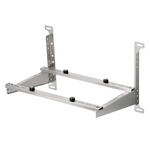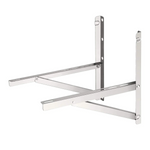
Replacing Old Appliances
Think of the last home appliance you replaced… Why did you decide to replace it in the first place? We usually replace our appliances because of 2 main reasons:
- Our old appliance still works, but we want one that works better.
- Our old appliance is no longer working and can’t be repaired.
What do you typically do with a home appliance that you’re not going to use anymore? Do you store it in your basement or somewhere inside your home? Do you give it away? Do you sell it?
Here are 5 things you can do with your old home appliance:
1. Store it:
If your old home appliance doesn’t work anymore you may have decided to put it away in your storage room (garage, basement), or just left it hanging around the house. That happens to many of us occasionally: we don’t know what to do with broken things or things we're not going to use anymore, so we just keep them. Then, as we begin to accumulate, our homes get full of clutter. And though it’s sometimes hard to detach from them, decluttering can make our lives way easier and more fulfilling.

Psychology Today lists some of the various benefits of decluttering. It mentions that decluttering:
- Boosts your self-confidence
- Gives you energy
- Reduces anxiety
What if we only had the things that we really needed? It would bring us many benefits and increase our overall well-being.
Now, this sounds great, but you still don’t know what else to do with your old home appliance. Don’t worry! We’ve got better solutions than storing it forever and ever.
2. Give it to charity

This option is great if your appliance isn’t damaged and works well. Do you ever give anything away for charity? Under which conditions? Sometimes we give away things that don’t work well. With time, I’ve personally learned the importance of donating things that are in good condition. I invite you to do this too! Think: “Would I use it?” Or, if slightly damaged, “Can it be repaired?” We must remember that the purpose of giving is helping others by impacting them in a positive way. So if you’ve got some very broken home appliances, we don't recommend that you give them to charity. There are other things you can do with them.
3. Have a garage sale

Who said putting some extra dollars in your wallet is a bad thing? You can sell your old home appliances as long as they’re working. Don’t sell anything that you know is already damaged or in a bad state: your reputation is at stake. If you sell things in bad condition, probably next time people won’t want to buy from you and will consider going to someone else’s garage sale instead. Always tell the truth about what you’re selling.
Oh well, unless... If you’ve got some vintage units that don’t work but that can be great for decoration we give you permission to sell them during your garage sale (as long as that’s what your customer wants).
4. Use it as decoration

Liked the idea of using home appliances for decoration? If you’ve got some vintage appliances, they can actually look pretty nice (if that’s your style). Or, you may have some beautiful modern ones that match your style if you're not into vintage. But try to keep your space as clutter free as possible. Always remember the importance of decluttering.
5. Recycle it

If you just toss away your home appliance you can really harm the environment, especially when it comes to appliances that contain hazardous materials. Besides, in most cases, it's illegal to throw most of them away with the rest of your trash. Please remember that every town/city has special procedures to follow.
Do you want to contribute to planet Earth? You can! Many home appliances can be recycled and many of their parts can be reused.
Some organizations even have rebate programs if you give them your home appliance for recycling. In some cases they'll only receive appliances that are still working, so you need to check the specifics of your unit with them.
On the other hand, if your unit definitely doesn’t work, you can call your local recycling company and ask them about the procedure to follow. They can usually help you out. Sometimes you may need to pay a fee to have it picked up at your place, but believe me, decluttering really makes a big difference (at least it does for me).
To summarize:
|
Status of your old home appliance |
Solution |
|
Works fine. |
|
|
Has some defects/malfunctions |
Take it to a certified technician for fixing.
|
|
Doesn’t work at all |
|
So, how to recycle dehumidifiers and air conditioners?
Home appliances such as air conditioners and dehumidifiers can’t simply be tossed away. They contain hazardous materials, so you'll need professional assistance to remove these materials from your unit. That’s something you should never try doing by yourself!
According to SF Gate, “it is illegal to dispose of such items without first removing the refrigerant, which is a dangerous procedure that requires a certified technician. Local recycling or bounty programs ensure your appliance is disposed of legally.”
Since each location has different policies, you'll need to contact your local recycling program to ask them about their specific procedures, or you can also contact rebate programs in your area too (many prefer appliances if they're Energy Star rated).
They'll let you know if you can recycle it or if you'll need to dispose of it and how to do it. They may remove the refrigerant for you, but you may have to find someone else to do it.
Do you need to replace your old dehumidifier?
You just might fall for one of these:
Testimonials:
“This works so well! I have emptied it 4 times in the first 24 hours since I began to use it in my basement. And it does not leak or drip like others I have used.” smm
“In 30 years the TOSOT humidifier has done the best job of dehumidifying my basement compared to all the others I have used.” Dion
“Had a dehumidifier several years ago that was recalled and I didn't replace at the time. However...had water in the basement and ordered this unit to reduce dampness and strong musty odor. Very happy with this purchase--easy to set up and immediate results(...)” Betty
Use information at your own risk: The information presented is intended for educational purposes only and is not intended to be a substitute for professional advice, diagnosis or treatment. Never disregard professional medical or home improvement advice. The information and suggestions should be discussed with a professional. You are responsible for independently verifying the information if you intend to rely upon or use it in any way. You use all information at your own risk.







